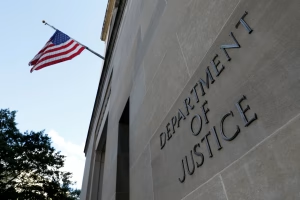Four Texas Sheriff's Deputies Die by Suicide in Six Weeks: A Tragic Loss.
In just six weeks, the Harris County Sheriff's Office (HCSO) has tragically lost four deputies—both current and former—who died by suicide. The deaths have deeply affected the department and the wider law enforcement community.
On March 19, Harris County Sheriff Ed Gonzalez shared the news on Facebook that a retiree had died from an apparent suicide, marking the third such loss within just one week. A few days later, reports confirmed that three additional deputies, Christina Kohler, Maria Vasquez, and William Bozeman, had also tragically taken their own lives.

Deputy Christina Kohler. HCSO Community Engagement Division Facebook
"This is a painful reminder that life is fragile and time is not promised," Sheriff Gonzalez wrote on social media. "Our hearts are heavy. We extend our deepest condolences to their families, colleagues, and friends."
The Deputies We Lost
The deputies who died by suicide include Deputy Christina Kohler, who was 37 and found on March 13; retired Deputy Maria Vasquez, who died in mid-March; former Deputy William Bozeman; and Long Nguyen, another former deputy who died on February 6. These deaths have been ruled suicides by the county medical examiner. The sheriff's office responded by sharing heartfelt tributes, emphasizing that the community had lost "two beautiful angels" and that their memories would inspire strength for those left behind.
The Mental Health Crisis Among Law Enforcement
The deaths of these deputies underscore the severe mental health challenges faced by law enforcement officers. According to Dr. Thomas McNeese, Director of the HCSO Behavioral Health Division, police officers can face "critical incidents" on a daily basis, with the average civilian exposed to only a few throughout their life. Over time, the stress of these repeated exposures can take a heavy toll, as evidenced by the recent suicides.
The HCSO created the Behavioral Health Division in 2020 to offer peer-to-peer support for officers experiencing stress or trauma. However, the recent events show just how urgent the need for comprehensive mental health support in law enforcement is.
The Call for Action: Support and Wellness in Law Enforcement
In light of these tragedies, leaders within the HCSO and the wider law enforcement community are reiterating the importance of mental health and officer wellness. As the Mecklenburg County Sheriff’s Office (MCSO) shared in a heartfelt message, "mental health matters," and it's crucial to remove the stigma surrounding seeking help. In the wake of these suicides, there is a renewed focus on fostering a culture of care, support, and open dialogue about mental health within law enforcement.
Moving Forward: A Culture of Support
While the recent suicides have undoubtedly rocked the HCSO, they also highlight the importance of continued mental health initiatives for officers. The department is working hard to ensure that support systems, such as peer-support deputies and resources for coping with traumatic events, are available to everyone in the department.
For many, this is a call to action—not just for the police force but for society as a whole. It's time to start addressing the mental health crisis in law enforcement and provide officers with the care they need to prevent further tragedies.
New Perspective: How Can We Protect Our First Responders' Mental Health?
The heartbreaking loss of these deputies raises a critical question: How can we better protect the mental health of our first responders?
Mental health challenges in law enforcement are often overlooked, but these recent tragedies show just how vital it is to create environments where officers feel supported and empowered to seek help without shame. Implementing stronger wellness programs, offering routine psychological evaluations, and encouraging open conversations about mental health could make a significant difference.
First responders deserve to be given the tools to take care of their mental health—because a community is only as strong as the people who protect it.
A Call for Action in Law Enforcement Mental Health
The recent suicides within the Harris County Sheriff's Office are a devastating reminder of the mental health struggles faced by law enforcement officers.
As the profession continues to expose officers to traumatic events, it becomes increasingly clear that mental health resources must be a top priority.
The tragic losses highlight a systemic issue that demands attention: the need for more robust mental health support, better access to resources, and an environment where officers feel comfortable seeking help without fear of stigma. It’s not enough to just offer support after a crisis—proactive efforts are essential to prevent these tragedies.
The time has come for a broader societal shift, where we acknowledge and address the mental health needs of those who dedicate their lives to protecting and serving. How many more lives will be lost before we fully recognize that mental health care is just as important as physical health care for those in law enforcement? It's time for action, not silence.
FAQs People Also Ask
1. How many deputies have died by suicide in the Harris County Sheriff's Office?
Four deputies from the Harris County Sheriff's Office have tragically died by suicide in the past six weeks, including both current and former members.
2. What mental health resources are available for law enforcement officers?
The Harris County Sheriff's Office has a Behavioral Health Division that provides peer-to-peer support and resources for officers experiencing stress or trauma.
3. What is the impact of law enforcement stress on officers?
Law enforcement officers are frequently exposed to traumatic events, with some officers facing multiple critical incidents every shift. Over time, this exposure can take a toll on their mental health, leading to conditions like PTSD, depression, and, tragically, suicide.
4. How can law enforcement agencies prevent suicides among officers?
Improving mental health support, removing the stigma surrounding seeking help, offering regular psychological evaluations, and fostering a supportive work environment are key steps in preventing officer suicides.
📰 Latest Articles You Might Like:
Explore the latest shocking true crime stories in this month’s roundup:





















